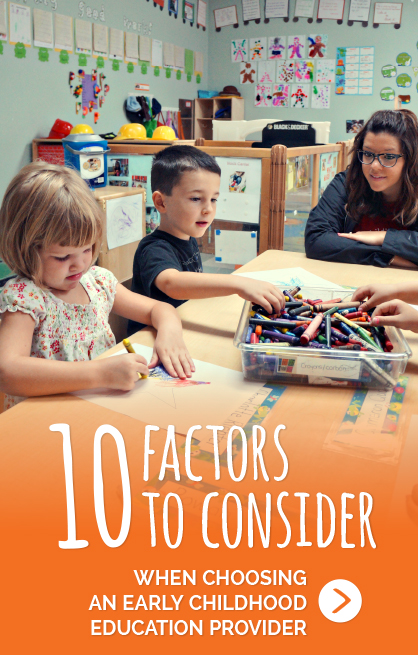Developing Life-Long Learners
A Child’s World Learning Centers’ mission to develop life-long learners is supported by our goal to provide the highest-quality educational program enriched with materials, activities, and an age-appropriate curriculum designed to meet the developmental needs of each individual child.
Learning to Learn
Children of preschool age are learning to learn. We provide a stimulating environment lead by Professional Educators who inspire a positive attitude toward learning while cultivating the 5 essential Domains of Development.
Domains of Development
A Child’s World Learning Center’s team of Professional Educators understands the importance of the following developmental areas and is by your children’s side each step of the way — encouraging and coaching them as they celebrate the milestones of early childhood education.
1. Approaches to Learning
This domain includes children’s attitudes toward, and interest in, learning and permeates every aspect of a child’s educational experience. These characteristics are the foundation of future learning and are revealed in each unique child’s own way.
Infants & Toddlers (Birth to 36 months)
- Curiosity and Eagerness
- Confidence, Risk-Taking, and Problem-Solving
- Attention, Effort, and Persistence
- Imagination, Creativity, and Invention
- Wonder and Delight
Preschoolers (Ages 3 years to 5 years)
- Pondering, Processing, and Applying Experiences
- Curiosity, Information-Seeking, and Eagerness
- Risk-Taking, Problem-Solving, and Flexibility
- Persistence, Attentiveness, and Responsibility
- Imagination, Creativity, and Invention
- Aesthetic Sensibility
2. Emotional and Social Development
This domain involves children’s feelings about themselves and their relationships with others. Skills are developed that allow them to make friends, appreciate differences in others, solve conflicts, and function effectively in groups.
Infants & Toddlers (Birth to 36 months)
- Developing a sense of self
- Developing a sense of self with others
- Learning about feelings
Preschoolers (Ages 3 years to 5 years)
- Developing a sense of self
- Developing a sense of self with others
- Learning about feelings
3. Health and Physical Development
This domain focuses on how young children learn about their bodies. It encompasses opportunities for children to begin developing and refining skills such as balance, coordination, etc. We provide these opportunities in a safe and accessible environment that respects physical, cultural, and individual differences.
Infants & Toddlers (Birth to 36 months)
- Physical Health and Growth
- Self-Care
- Safety Awareness
- Gross Motor/Large Muscle
- Fine Motor/Small Muscle
Preschoolers (Ages 3 years to 5 years)
- Physical Health and Growth
- Self-Care
- Safety Awareness
- Gross Motor/Large Muscle
- Fine Motor/Small Muscle
4. Language Development and Communication
Children begin learning language as infants. Strong foundations for communication are formed as families and other caregivers talk, sing, laugh, read, and interact with children. Research supports that young children who are nurtured in environments filled with print, books, and conversations with supportive adults acquire knowledge and skills that greatly impact their success in future academic endeavors.
Infants & Toddlers (Birth to 36 months)
- Receptive Language
- Expressive Language
- Early Literacy
Preschoolers (Ages 3 years to 5 years)
- Receptive Language
- Expressive Language
- Foundations for Reading
- Foundations for Writing
5. Cognitive Development
This domain focuses on children’s natural curiosity and ability to acquire, organize, and use information. They learn through playing, exploring, and discovering.
Infants & Toddlers (Birth to 36 months)
- Sensory Exploration and Discovery
- Social Connections
- Concept Development and Memory
- Problem-Solving
- Creative Expression
Preschoolers (Ages 3 years to 5 years)
- Social Connections
- Creative Expressions
- Mathematical Thinking and Expression
- Scientific Thinking and Invention

